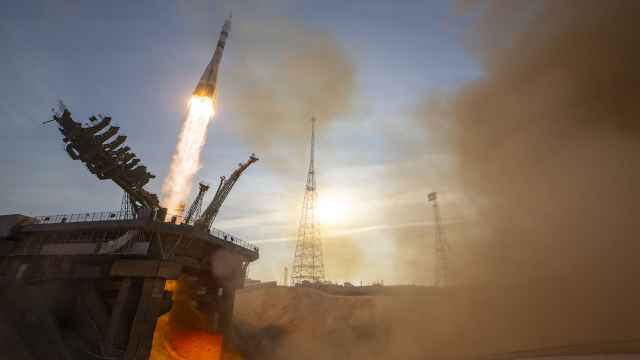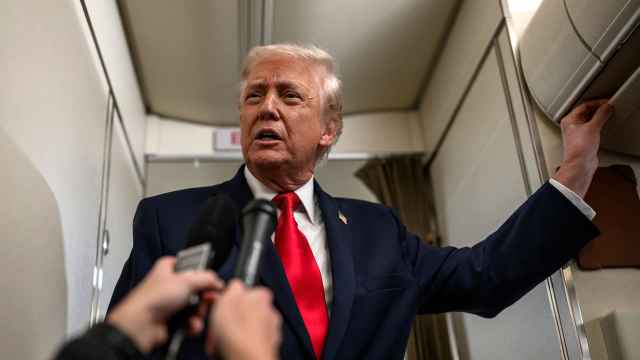BISHKEK, Kyrgyzstan — The United States will reconsider its military presence in Kyrgyzstan once it winds down its combat mission in Afghanistan in 2014, U.S. Secretary of State Hillary Rodham Clinton said Thursday.
She offered no indication whether the administration of President Barack Obama hopes to maintain a presence at the Manas air base, which plays a central role in moving troops and supplies to support the war effort in Afghanistan. Russia has objected to having the U.S. military set up so close to its borders.
Speaking to students and civic leaders in a Kyrgyz television interview, Clinton said the United States and its NATO partners agreed last month in Lisbon, Portugal, to begin turning over control to local Afghan authorities in 2011, with a goal of completing that transition by the end of 2014.
"Then we will look to see if there is any continuing mission" for U.S. troops at Manas, she said.
Later, in a pep talk to American troops at Manas, Clinton said: "You're not going to be here indefinitely."
The United States has used Manas as a major transit point since the Afghan war began in 2001. The base has been a sore subject with Russia. It has also been the source of tension in U.S.-Kyrgyz relations, in part because of Kyrgyz suspicion of corruption in contracts for supplying the air base with fuel.
Clinton said Thursday that the United States has agreed to include a Kyrgyz firm in the contracting for fuel supplied to Manas.
At a news conference with current President Roza Otunbayeva, Clinton said the United States will help set up a Kyrgyz entity that would bid for a portion of the lucrative fuel supply contracts.
Those contracts were held by companies that authorities suspected of links with the family of the Kyrgyz president overthrown earlier this year. President Kurmanbek Bakiyev was unseated amid bloody public street protests over festering living standards and perceived corruption.
The two companies involved — Red Star Enterprises and Mina Corporation, both based in Gibraltar — have denied any ties to the Bakiyev family.
Later, Clinton flew to neighboring Uzbekistan, where she met with President Islam Karimov and urged him to take action to ensure human rights and freedom.
Before leaving Bishkek, she told reporters that she would raise U.S. concerns about Uzbekistan's human rights record, as well as its willingness to allow some U.S. war supplies to transit into Afghanistan.
Clinton seemed to anticipate that her human rights pitch might not resonate with Karimov.
"Sometimes countries are willing to work with us to improve their human rights profile, to support democratic development, and sometimes it's a harder case to make," she said. "I'm well aware of the many challenges existing in Uzbekistan."
Clinton was meeting privately with human rights activists and religious and civic leaders in Tashkent. According to her prepared remarks, she was to tell them that the U.S. always raises human rights issues with Uzbek government leaders.
"No country has a monopoly on wisdom in this area, including the United States," she said in the prepared text. "So, when we speak to your government about issues such as religious and media freedom, torture or child labor, we do so in a spirit of mutual respect."
Clinton also signed a U.S.-Uzbek cooperation agreement that enables arrangements in which the two governments and U.S. and Uzbek institutes, universities, research centers and private companies can cooperate on science and technology.
Later she was flying to Manama, Bahrain, where she was scheduled to attend an international security conference Friday.
A Message from The Moscow Times:
Dear readers,
We are facing unprecedented challenges. Russia's Prosecutor General's Office has designated The Moscow Times as an "undesirable" organization, criminalizing our work and putting our staff at risk of prosecution. This follows our earlier unjust labeling as a "foreign agent."
These actions are direct attempts to silence independent journalism in Russia. The authorities claim our work "discredits the decisions of the Russian leadership." We see things differently: we strive to provide accurate, unbiased reporting on Russia.
We, the journalists of The Moscow Times, refuse to be silenced. But to continue our work, we need your help.
Your support, no matter how small, makes a world of difference. If you can, please support us monthly starting from just $2. It's quick to set up, and every contribution makes a significant impact.
By supporting The Moscow Times, you're defending open, independent journalism in the face of repression. Thank you for standing with us.
Remind me later.





